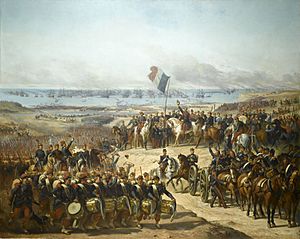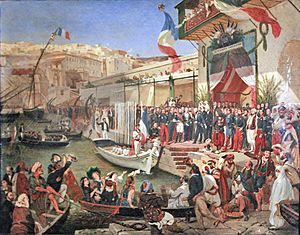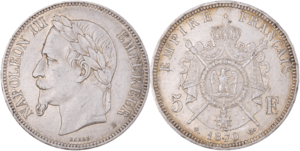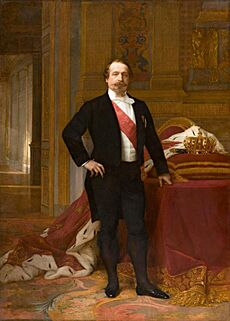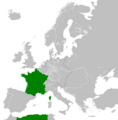Second French Empire facts for kids
Quick facts for kids
French Empire
Empire Français (French)
|
|||||||||||||||
|---|---|---|---|---|---|---|---|---|---|---|---|---|---|---|---|
| 1852–1870 | |||||||||||||||
|
Anthem: "Partant pour la Syrie" (de facto)
"Departing for Syria" |
|||||||||||||||
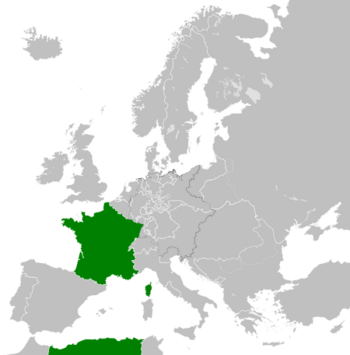
The Second French Empire in 1861
|
|||||||||||||||
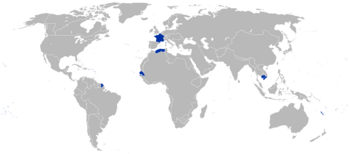
Colonies and territories held by the Second French Empire in 1867, highlighted in blue
|
|||||||||||||||
| Capital | Paris | ||||||||||||||
| Official languages | French | ||||||||||||||
| Religion |
|
||||||||||||||
| Demonym(s) | French | ||||||||||||||
| Government | Unitary Bonapartist autocratic authoritarian self-proclaimed absolute monarchy (1852–1869)
(1869–1870) |
||||||||||||||
| Emperor | |||||||||||||||
|
• 1852–1870
|
Napoleon III | ||||||||||||||
| Cabinet Chief | |||||||||||||||
|
• 1869–1870
|
Émile Ollivier | ||||||||||||||
|
• 1870
|
Charles de Palikao | ||||||||||||||
| Legislature | Parliament | ||||||||||||||
| Senate | |||||||||||||||
| Corps législatif | |||||||||||||||
| Historical era | New Imperialism | ||||||||||||||
|
• Coup of 1851
|
2 December 1851 | ||||||||||||||
|
• Constitution adopted
|
14 January 1852 | ||||||||||||||
| 1 September 1870 | |||||||||||||||
| 4 September 1870 | |||||||||||||||
|
• Fall of Metz
|
27 October 1870 | ||||||||||||||
| Currency | French franc | ||||||||||||||
|
|||||||||||||||
| Today part of | France Algeria |
||||||||||||||
The Second French Empire, also known as the French Empire, was a powerful government in France. It was led by Napoleon III from 1852 to 1870. This period came between two other French governments: the Second French Republic and the Third French Republic.
During this time, France made big improvements to its buildings and economy. It also became a very strong country in Europe. At first, some historians didn't like the Second Empire. But later, people saw it as a time when France became more modern. Napoleon III helped French businesses grow and sell their products to other countries.
One of the best things he did was build a huge railway system. This helped trade and connected the whole country to Paris. Paris itself was rebuilt with wide streets and beautiful buildings. This made the city a world-famous place.
Napoleon III also tried to make France powerful around the world. He started many colonies and fought in several wars. France won battles in Crimea and Italy. They gained new lands like Savoy and Nice. He also expanded the French Empire in North Africa and French Indochina.
However, some of his plans didn't go well. He tried to set up an empire in Mexico, but it failed. He also didn't handle the growing power of Prussia very well. In the end, France had no allies when it faced strong German armies. His rule ended during the Franco-Prussian War in 1870. He was captured and removed from power. He later died in England.
Contents
How the Empire Began
From President to Emperor
On December 2, 1851, Louis-Napoléon Bonaparte was the President of France. He made a bold move by closing down the French National Assembly, which was against the rules. This made him the sole ruler of France. He also brought back the right for all men to vote. People supported his actions in a vote later that month. About 92% of people said yes to his changes.
A new constitution was approved in January 1852. It made Louis-Napoléon president for ten years and gave him almost all the power. But he wanted more. He soon started working to bring back the empire. People officially asked for the empire to return. So, in November, another vote was held. This time, 97% of people supported it.
On December 2, 1852, the empire was officially brought back. Louis-Napoléon became "Napoléon III, Emperor of the French." The new rules made his position hereditary, meaning his family could rule after him. This idea of popular votes to support a ruler became a key part of his style of government.
Early Years of the Empire
As emperor, Napoleon III had a lot of power. One of his main goals was to build a great railway system. He combined many small railway lines into six big companies. These companies all connected to Paris. Paris grew a lot during this time, with more people, industries, and businesses.
Napoleon III worked with Georges-Eugène Haussmann to rebuild Paris. They spent a lot of money to make the city beautiful. The government also helped the railway companies by promising to cover their costs if they struggled. Even though France started building railways later than some countries, by 1870, it had an excellent system. This system was also supported by good roads, canals, and ports.
After some time, Napoleon III wanted to get more support from different groups of people. In 1859, he offered a general pardon to many who had opposed him. This showed that his rule was becoming more open and less strict.
Religion in the Empire
The Second Empire strongly supported Roman Catholicism, which was the official state religion. However, it also allowed Protestants and Jews to practice their faiths. There were no persecutions or attacks against them.
The government worked with the small Protestant community. Many Protestant business people supported the emperor's rule. A new law in 1852 gave the government more control over Protestant church matters. This meant that Catholic officials, who sometimes didn't understand Protestant beliefs, had more say in their affairs.
Controlling Information
Napoleon III used different ways to control the media and stop people from speaking against him. He had wide powers, but there were some limits. The police system was very organized and had a lot of control. It was hard for the public to check what the police were doing.
The Second Empire continued this system. Police forces were made stronger. However, some people thought the secret police were more powerful than they actually were. The imperial police did not have total control like in some later strict governments.
Freedom of the Press Changes
At first, the government controlled what newspapers could print. But in November 1860, Napoleon III allowed the Parliament to discuss his speeches. He also gave the press the right to report on these debates. He hoped this would help with the growing opposition from Catholics. They were worried about his policies in Italy.
The government also allowed the Parliament to vote on parts of the budget in 1861. This gave his opponents a new way to challenge him. Problems like a struggling economy and issues with other countries also helped the opposition.
Rising Opposition

Napoleon III made some mistakes in his foreign policy. He didn't help Poland when it was in trouble. He also allowed Prussia to win against Denmark. These problems led different groups to form a team called the Union libérale. This group included royalists, liberals, and republicans.
In the elections of 1863, the opposition gained 40 seats. A leader named Adolphe Thiers spoke for them. He demanded more freedoms. It was clear that many French people wanted changes. Napoleon III tried to make peace with the opposition. He changed some of his ministers and appointed a new minister of education who was against the Church.
However, some republicans, like Victor Hugo, still strongly opposed the emperor. They wanted to get rid of the empire completely. Napoleon III then tried to get support from working-class people. He believed they had helped him gain power before.
Working Class and Political Changes
Working-class people started to get more involved in politics. They were influenced by new ideas about workers' rights. They held meetings that were not allowed by the government. They said that workers needed political freedom to truly be free. This led to a connection between these workers and the republican middle class.
The Empire was surprised by this. It tried to control both the middle class and the workers, but this only made them more rebellious. There were many strikes. In the elections of May 1869, the Empire suffered a big loss. Many people who wanted change were elected.
Because of this, Napoleon III had to make more changes. In September 1869, he changed the government to be more like a parliamentary monarchy. This meant the Parliament had more power. In January 1870, a new government was formed with Émile Ollivier as its head.
The 1870 Vote
Most people were happy with these changes, as they brought more freedom and order. But the republican party still wanted to overthrow the Empire. A journalist was killed by a member of the imperial family, which gave revolutionaries a chance to cause trouble. But their uprising failed.
To get support for his policies, the emperor held a public vote on May 8, 1870. It was a big success for Napoleon III. Seven and a half million people voted yes, and only one and a half million voted no. However, the vote also showed that France was divided. People in rural areas mostly supported him, while people in big cities often opposed him.
Foreign Relations
The Crimean War ended in 1856. This was a victory for Napoleon III. Russia was no longer allowed to have a navy in the Black Sea. His son, Louis-Napoléon Bonaparte, was born that same year. This seemed to promise that his family would continue to rule.
In 1859, France went to war with Austria over Italy. France won and gained new territories: Savoy and Nice.
In 1860, France signed a trade agreement with Great Britain. This agreement promoted free trade. It meant that French businesses suddenly faced more competition from foreign goods. This made some Catholics and businesses unhappy. They realized that the emperor's strong rule was good when it helped them, but not when it hurt their interests.
During the American Civil War (1861–1865), France officially stayed neutral. It never recognized the Southern states as a separate country. The Northern states warned that recognizing the South would mean war. However, French factories needed cotton from the South. Napoleon also had plans for Mexico, which the Southern states could help with. But Britain refused to join France in helping the South, and Napoleon knew a war with the U.S. alone would be bad for France.
Napoleon dreamed of creating a French economic area in Latin America, with Mexico at its center. He helped Mexico modernize its economy. But his army fought against local rebels who had American support. By 1863, France's military action in Mexico to set up a new empire there was a complete disaster. The Mexicans fought back. After the American Civil War ended, the U.S. demanded that France leave Mexico. The U.S. even sent 50,000 soldiers to the border to make its point. The French army left, and the emperor they had put in charge was executed.
From 1861 to 1863, France started to colonize parts of Cochinchina (southern Vietnam) and Annam (central Vietnam). This conquest was difficult but successful. Many French soldiers, missionaries, and business people went there.
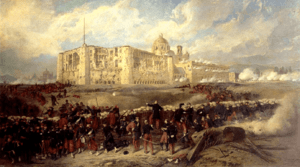
France's support for Italy made other nations hopeful for their own freedom. But when Italy became a united country in 1861, it showed that half-measures could be dangerous. In 1863, other nations also demanded their rights. These included Poland, Schleswig and Holstein, and the Danubian principalities.
The emperor tried to hold a meeting to solve the Polish problem, but it didn't work. Great Britain refused to join, and other countries only agreed under conditions that made the meeting useless. Napoleon's support for Polish rebels made Russia angry. The Russian Tsar's visit to Paris almost ended badly when he was attacked by Polish assassins. In Berlin, Otto von Bismarck saw this as a chance to weaken France by getting closer to Russia.
The success of the 1870 vote should have made the Empire stronger. But it actually led to its downfall. People thought a diplomatic win would make the country forget about freedom and focus on glory. The Empress Eugénie was even said to have remarked, "If there is no war, my son will never be emperor."
Expanding the Empire Overseas
Napoleon III doubled the size of France's overseas empire. He took control of New Caledonia and Cochinchina. He also set up a protectorate in Cambodia in 1863. France also colonized parts of Africa. He joined Britain in sending an army to China during the Second Opium War in 1860. However, French efforts to gain influence in Japan and Korea failed.
To manage these new overseas projects, Napoleon III created a new Ministry of the Navy and the Colonies. He appointed an energetic minister, Prosper, Marquis of Chasseloup-Laubat, to lead it. A key part of this plan was to modernize the French Navy. He started building many powerful steamships and troop transports. The French Navy became the second strongest in the world, after Britain's.
He also created new colonial troops. These included special units like naval infantry and the French Foreign Legion. The Foreign Legion had been founded in 1831 and fought well in many wars. By 1870, French overseas territories had tripled in size. They covered almost a million square kilometers and had nearly five million people.
While soldiers, administrators, business people, and missionaries went to the colonies, very few French people settled there permanently, except in Algeria. Trade with the colonies brought in a lot of money, but the costs of running the colonies were even higher. A main goal was the 'Mission civilisatrice', which meant spreading French culture, language, and religion. This part of the mission was successful.
The End of the Empire
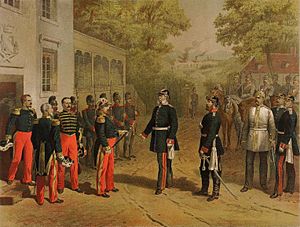
In the 1860s, the nearby state of Prussia grew very strong. This threatened France's power in Europe. Napoleon, who was becoming weaker in health, handled the situation poorly. He ended up in a war without any allies.
Britain was worried about French military power and refused to help. Russia was angry because France had supported Polish rebels in 1863. Napoleon had strongly supported Italy, but he refused to let Italy take Rome. He kept French troops in Rome to protect the Pope. This made Italy refuse to help France. The United States was still upset about France's failed plan in Mexico.
Napoleon was unsure what to do. But the Prussian Prime Minister, Otto von Bismarck, had a clear plan. He wanted to create a new, powerful German nation led by Prussia. He also wanted to make France look bad. After Austria was defeated by Prussia, Napoleon wanted to make his army stronger. But the French Parliament disagreed. They thought professional soldiers were better. Napoleon backed down.
The immediate cause of the war was a small argument about who should rule the Spanish throne. France won the diplomatic argument, but Napoleon wanted to humiliate the Prussian king, William I. Bismarck then tricked France into declaring war on Prussia on July 15, 1870. This started the Franco-Prussian War.
The French army made the first move. On August 2, they defeated a Prussian group and took the town of Saarbrücken. But two days later, the Prussians attacked and pushed back the French army. France suffered big losses in the first nine days of August.
The emperor gave control to his generals. He asked his wife if he should return to Paris, but she said no. So, he only sent his son home. The French prime minister resigned. A new, more effective military leader took over. He organized the French army, which tried to help the main French army trapped in Metz. But the army was pushed back by the Prussians. They retreated to Sedan, where they were surrounded and forced to surrender after the Battle of Sedan. Napoleon himself became a prisoner.
Republican forces quickly took control of Paris. France, led by Léon Gambetta, declared the start of the Third French Republic. Napoleon and Empress Eugénie went to live in England. The German victory led to a wave of German pride. Bismarck used this to unite all the German states (except Austria). This created the German Empire, with the Prussian king as its emperor. Germany became the strongest military power in Europe. France was also forced to give up two border regions, Alsace and Lorraine. This humiliation lasted for many years.
How the Government Worked
The way the French government worked during the Second Empire was similar to the First French Empire. Emperor Napoleon III believed that his role as emperor was the most important. He felt that he was chosen by the people through voting and represented everyone. His job was to guide the country towards fairness and peace. He believed he got his power from his famous uncle, Napoleon I of France.
Napoleon III had often criticized past governments for not caring about social problems. So, he felt it was important to solve these issues in France. His solution was a government based on the "Napoleonic Idea." This meant the emperor, chosen by the people, ruled supreme.
The French Constitution of 1852, put in place by Napoleon III in January 1852, was much like the one from 1848. All executive power was given to the emperor. He was the head of state and only answered to the people. The people of the Empire had few democratic rights. They had to trust the emperor's kindness, not the kindness of politicians. He chose the members of the state council, who prepared laws, and the senate, a permanent part of the empire.
One new thing was that the legislative body was elected by all men who could vote. But this body could not suggest laws. All laws had to be proposed by the emperor's government. This change quickly led to the same result as a past event called Brumaire. On December 2, 1852, France, still influenced by Napoleon's past and afraid of chaos, almost completely agreed in a vote to give supreme power to Napoleon III, with the title of emperor.
The Legislative Body was not allowed to choose its own leader or make its own rules. It could not suggest laws or changes to laws. It could not vote on the budget in detail or make its discussions public. Also, even though all men could vote, the government controlled elections. They supported certain candidates and stopped the opposition from speaking freely. They also drew election districts in a way that made it hard for liberal voters to win.
The press was also controlled. Newspapers had to pay a deposit as a guarantee of good behavior. They also received warnings from the government to stop printing certain articles. If they didn't obey, they could be suspended or shut down. Books were also checked by the government before being published.
To stop people who opposed the government, suspects were watched closely. In 1858, an attack on the emperor, though for Italian reasons, was used as an excuse to make the rules even stricter. A law was passed that allowed people to be imprisoned, exiled, or sent away without a trial if they were suspected of something. Education was also strictly controlled. The teaching of philosophy was stopped in high schools, and the government had more power over schools.
For seven years, France had no real democratic life. The Empire ruled by holding public votes. Until 1857, there was almost no opposition. From then until 1860, only five members opposed the government. Royalists waited quietly after a failed attempt in 1853 to bring back the monarchy.
Images for kids
See also
- French colonial empire
- French Africa
- List of French possessions and colonies
- History of France
- International relations of the Great Powers (1814–1919)
- Paris during the Second Empire
- Second Empire (architecture)
- Fires at the Paris Commune
- Freemasonry under the Second French Empire
 | Roy Wilkins |
 | John Lewis |
 | Linda Carol Brown |





